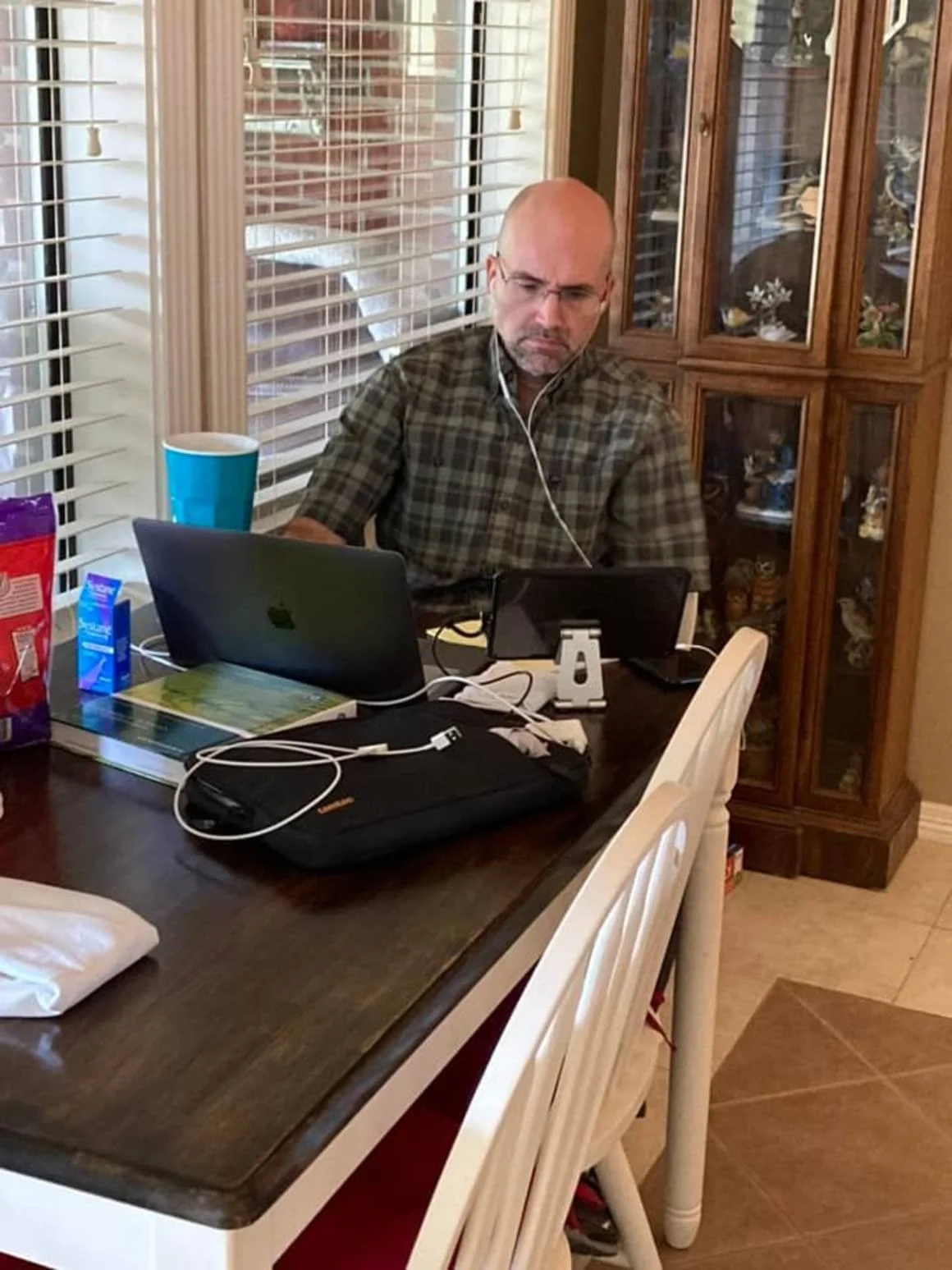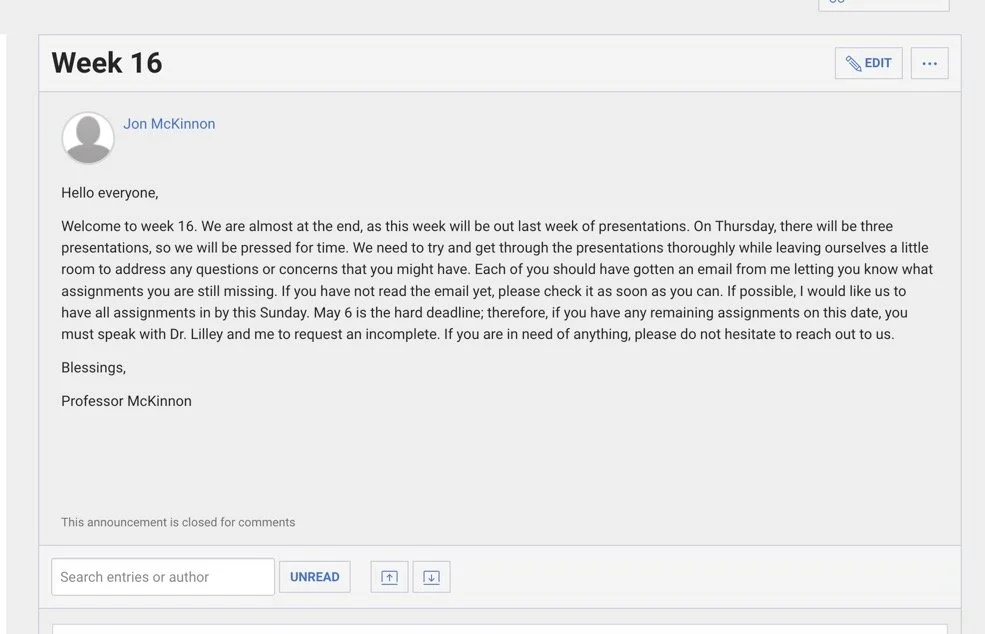Supervision
Taking my superivsion class online during COVID.
CACREP SUPERVISION STANDARDS
a. purposes of clinical supervision
b. theoretical frameworks and models of clinical supervision
c. roles and relationships related to clinical supervision
d. skills of clinical supervision
e. opportunities for developing a personal style of clinical supervision
f. assessment of supervisees’ developmental level and other relevant characteristics
g. modalities of clinical supervision and the use of technology
h. administrative procedures and responsibilities related to clinical supervision
i. evaluation, remediation, and gatekeeping in clinical supervision
j. legal and ethical issues and responsibilities in clinical supervision
k. culturally relevant strategies for conducting clinical supervision
Listening to the audio of a colleague’s counseling session.
Reflection
Before entering the CES program at Liberty, I needed more opportunities to supervise other counselors. As I moved toward the end of my program at Liberty, I was also provided opportunities to begin leading others at work. Thankfully, my supervision class came at the perfect time and began to lay the foundation for my development as a supervisor. I cannot emphasize how important this class was for my development. I had received supervision from others, but this class allowed me to reflect on the supervision process and develop a model of supervision that would be relevant to me. It allowed me to examine different approaches to supervision and incorporate them into my supervision style. This helped increase my confidence in my ability to supervise and improve the supervision I will provide for years.
Since taking the supervision class, I have had more opportunities to provide supervision and put into practice the skills I have learned. Before the course, my supervision was similar to what I experienced as a clinician. However, after completing the supervision class, I was exposed to alternative perspectives and methods of supervision. My supervision and teaching internships helped me further hone the skills I was developing and allowed me to practice those skills as a supervisor. My time at Liberty has improved my confidence in my ability and has empowered me to be an effective counselor supervisor.
The next challenge for this area is gaining the credentials I need to supervise in my state. Previously, my license was allowed to supervise any other mental health licensures. Still, recent changes in the state have led most mental health professions to retreat to their corners and only allow supervision to count towards licensure if an equivalently licensed professional provides it. In other words, LPCs must supervise all hours for LPCs, MFTs must supervise all hours for MFTs, etc.… To supervise licensed professional counselors, I will need to get my license as an LPC, hopefully by equivalency. Then, I need to attend supervision training to become certified by the state to supervise clinical hours for those seeking licensure.
Since my faith is present in the things I do, Jesus’s example and ministry roles (Master, Healer, Teacher, Servant, Friend) serve as the basis of my supervisory model. In the same way that we can be the hands and feet of Christ in a counseling session, I believe we can embody Christ as a supervisor. Additionally, my model makes room for the supervisee’s faith and how it could impact their counseling process with others.
This is a copy of an announcement I made to my class during my supervision internship.
Artifacts
Artifact 1
My supervision model was written during my counselor supervision class and outlined my supervision model (e). This paper was a great exercise and helped me develop my views on supervision concerning the purpose of supervision (a) and my role as a supervisor (c). It also discusses how I assess supervisees (f).
Artifact 2
At the end of supervision, we had to write a final reflection paper on our work with our supervisee. In this assignment, I had to reflect on how I evaluated my supervisee (f), the modality of supervision I used (g), document my administrative duties of supervision (h), provide an evaluation of the supervisee (i), review any legal or ethical concerns related to his clients (j), and consider how culture played a role in the supervisory process (k).
Artifacts 3 & 4
The following two documents are reviews that I received from my supervision internship. The first form is the evaluation from my faculty supervisor, and the second form is the feedback I received from the students. I was evaluated for my effectiveness as a supervisor (a-d, k), how I assessed them (f), and how I handled administrative duties (h).
Artifact 5
The following assignment was a presentation I did in my supervision class. It is over CBT supervision. I utilized Menti in this presentation and inserted copies of my peers’ responses in the slides. This presentation meets standards b (I taught on a model of supervision), c (it allowed me to fill a role in supervision as a teacher), f (I explored how this model assesses supervisees), g (demonstrates my use of technology), and j (examined how you maintain ethical CBT supervision).
Discussing a case with a colleague.
Artifacts 6-9
The following papers are from my supervision internship. They include my group video presentation, my individual presentation, my self-evaluation for my group, and my individual supervision session. These assignments covered multiple standards. My individual presentation and supervision session required me to consider culture's impact on my supervisee (k) and her developmental level. (f). I also had to consider these factors in my group presentation and self-evaluation. In my group evaluation, I noted ethical concerns (j). All of these documents required me to practice administrative duties (h).
Reproductions & Other Artifacts
This link will bring you to bonus supervision material, including video demonstrations. This link is password-protected, so anyone wanting to see this material must communicate directly with me.

Memberships
Association for Counselor Education and Supervision (ACES)
Membership is maintained at National, Regional, and State Levels

Leading supervision internship class online.
Supervision Experience
Supervision Internship, Liberty University, VA (2022)
Provided online group supervision and individual supervision as needed. Reviewed, graded, and left feedback for all student’s verbatims and reports.
Director of Counseling, Nashville Rescue Mission (2021-Present)
Provide guidance and direction for life recovery program life coaches and therapists. Supervise therapists weekly through individual and group supervision. Train life coaches and therapists concerning relevant counseling practice. Helped to develop a new program curriculum.
Assistant Director of Counseling, Nashville Rescue Mission (2019-2021)
Provided guidance and direction for life recovery program life coaches and therapists under the supervision of the Director of Counseling. Supervised therapists weekly through individual and group supervision. Trained life coaches and therapists concerning relevant counseling practice. Helped to develop a new program curriculum.



